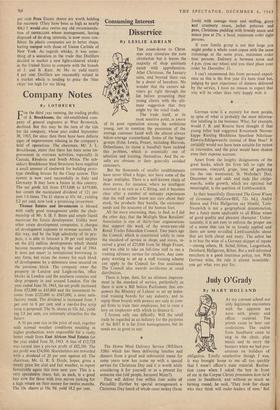Consuming Interest
Disservice
By LESLIE ADRIAN But the thousands of smaller establishments have never lifted a finger, nor have some of the larger multiples. There is a well-known chain of shoe stores, for instance, where an intelligent assistant is as rare as a C fitting, and it becomes clear after a number of unhappy experiences that the staff neither know nor care about their stock, the products they handle, the customers' needs and the anatomy of the human foot.
All the more interesting, then, to find, as I did the other day, that the Multiple Shoe Retailers' Association is one of thirty-four organisations that support the work of the seven-year-old Retail Trades Education Council. Two years ago the Council, which is constituted solely to raise the standard of service in shops and stores, re- ceived a grant of £25,000 from Sir Hugh Fraser, and was able to take on full-time staff to run a training advisory service for retailers. Any com- pany wanting to set up a staff training scheme can apply to the Council for free assistance. The Council also awards certificates in retail distribution.
There is hope, then, for an ultimate improve- ment in the standard of service, particularly as there is now a Bill before Parliament that em- powers the Ministry of Labour to set up indus- trial training boards for any industry, and to equip these boards with powers not only to com- pel firms to train their employees, but to raise a levy on employers with which to finance it.
I foresee only one difficulty. Will the retail trade be regarded as an industry for the purposes of the Bill? It is far from homogeneous, but its needs are as great as any.
The Home Meal Delivery Service (WEStern 3286) which has been delivering lunches and dinners from a good and substantial menu for some years now has come up with a special service for Christmas Day and it is worth while considering it for yourself or as a present for someone else (old people, harassed Mum?).
They will deliver free within four miles of Piccadilly (further by special arrangement) a Christmas Day lunch of whole roast turkey (farm fresh) with sausage meat and stuffing, gravy k and cranberry sauce, jacket potatoes and peas, Christmas pudding with brandy sauce and mince pies at 25s. a head, minimum order eight persons.
If your family group is not that large you might prefer a whole roast capon with the same trimmings at the same price, minimum order four persons. Delivery is between noon and 4 p.m. (you say when) and you must place your order by December 21.
I can't recommend this from personal experi- ence as this is the first year it's been tried but, judging by past experience of dinners delivered by the service, I have no reason to expect that you will be other than very happy with it.
German wine is a mystery for most people, in spite of what is probably the most informa- tive labelling in the business. What, for example, would J. B. and Roscoe have thought if that young feller had suggested Kreuznach Narren- kappe Riesling Hochfeine Spaetlese Nikolaus- Eiswein-Edelgewaechs instead of Blue Nun? It certainly would not have been suitable for turbot or tournedos, and the price would have shaken even their expense account.
Apart from the lengthy designations of the great hocks, which list from left to right the commune, vineyard, grape, time of gathering (in the one mentioned, St. Nicholas'S Day, December 6) and odds and ends like edelge- waechs, noble growth, which are optional but meaningful, is the question of Liebfraumilch.
In their beautifully illustrated The Great Wines of Germany (McGraw-Hill, 72s. 6d.), Andre Simon and Fritz Hallgarten say bluntl}i, `Lieb- fraumilch is not a geographical denomination, but a fancy name applicable to all Rhine wines of good quality and pleasant character.' Unfor- tunately, it is not easy to enforce the proper use of a name that can be so loosely applied and there are some so-called Liebfraumilchs about that are both cheap and nasty. The safest bet is to buy the wine of a German shipper of repute —among others, H. Sichel,Sohne, Langenbach, Deinhard, Hallgarten, Bohm. But a welt-informed merchant is a good insurance policy, too. With German wine, the rule is almost invariable: you get what you pay for.






































 Previous page
Previous page